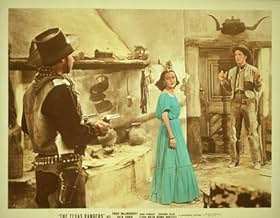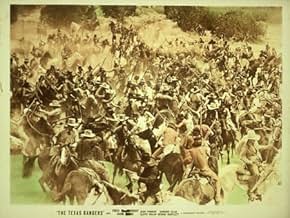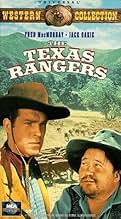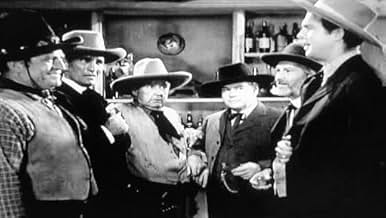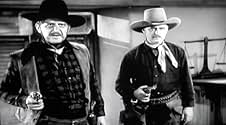Dos ex forajidos con mala suerte se ofrecen como voluntarios para ser Texas Rangers y se ven asignados a traer a un viejo amigo, ahora un famoso forajido.Dos ex forajidos con mala suerte se ofrecen como voluntarios para ser Texas Rangers y se ven asignados a traer a un viejo amigo, ahora un famoso forajido.Dos ex forajidos con mala suerte se ofrecen como voluntarios para ser Texas Rangers y se ven asignados a traer a un viejo amigo, ahora un famoso forajido.
- Dirección
- Guionistas
- Elenco
- Nominado a 1 premio Óscar
- 1 nominación en total
Benny Bartlett
- David
- (as Bennie Bartlett)
Fred Kohler
- Jess Higgins
- (as Fred Kohler Sr.)
George 'Gabby' Hayes
- Judge Snow
- (as George Hayes)
Stanley Andrews
- First Higgins Henchman
- (sin créditos)
Irving Bacon
- David's Father
- (sin créditos)
Kathryn Bates
- School Teacher
- (sin créditos)
John Beck
- Stage Passenger
- (sin créditos)
Hank Bell
- Hank Wallace, Texas Ranger
- (sin créditos)
Virginia Brissac
- David's Mother
- (sin créditos)
Opiniones destacadas
This Paramount studio effort stars Fred MacMurray, who many folks today only remember as the Dad in My Three Songs or the Flubber films. But MacMurry could do almost anything and do it well, from his cunning performance as the weak insurance foil in the classic noir Double Indemnity to his brilliant turn as the amoral business executive in The Apartment.
Here early MacMurray is pared with Jack Oakie, the latter an endearing studio performer who brings some genuine warmth and humor to what in many ways is a typical studio Western, but much richer than the usual B oaters churned out by Republic or Monogram; this is essentially a tale of cowboy reformation, as three thieving get separated by circumstance and two of them choose community and goodness, while one--the notorious polka dot bandit (!), played by Lloyd Nolan, stays outside the law. Nolan, who usually played good second leads or endearing detectives, effortlessly engages in a wee bit of method acting, convincing in his greasy charm, oozing villainy and malice.
While not a landmark film in any way, this is a casual, amiable entertainment, good for a lazy afternoon (coupled with a bowl of popcorn and perhaps a Charlie Chan mystery).
Here early MacMurray is pared with Jack Oakie, the latter an endearing studio performer who brings some genuine warmth and humor to what in many ways is a typical studio Western, but much richer than the usual B oaters churned out by Republic or Monogram; this is essentially a tale of cowboy reformation, as three thieving get separated by circumstance and two of them choose community and goodness, while one--the notorious polka dot bandit (!), played by Lloyd Nolan, stays outside the law. Nolan, who usually played good second leads or endearing detectives, effortlessly engages in a wee bit of method acting, convincing in his greasy charm, oozing villainy and malice.
While not a landmark film in any way, this is a casual, amiable entertainment, good for a lazy afternoon (coupled with a bowl of popcorn and perhaps a Charlie Chan mystery).
The Texas Rangers is directed by King Vidor who also co-writes with Elizabeth Hill, Louis Stevens and Walter Prescott Webb. It stars Fred MacMurray, Jack Oakie, Jean Parker and Lloyd Nolan. Music is by Gerard Carbonara and cinematography by Edward Cronjager. Plot has MacMurray and Oakie as two outlaws who decide to become Texas Rangers, something which invariably brings them into conflict with another outlaw pal.
It showcases the good and bad of 1930s Westerns. The action is strong and vibrant, the landscapes appealing and the story as a premise is always interesting. But those good points are countered with weak scripting, goofs, logic holes and a mixed bag of acting performances. But all told, Vidor's movie comes through its problems to stay firmly on the good side of good for the Western fan.
It's good guys versus bad guys on the home front, with the Indians lining up in numbers to be the common foe. It's here for the latter, where Vidor excels, constructing the action scenes with great skill as a ream of extras in Indian attire attack in their droves, arrows and bullets fly with murderous worth, bodies hurl and fall about, it's exciting stuff. The highlight coming as the Indians start flinging boulders off of a cliff face down onto the Rangers down below; the sound work here especially great, as is the stunt work in this whole segment of the film.
MacMurray and Oakie make a likable pair, but both seem a touch out of place in this portion of the Wild West. But Nolan cuts a nice snarly figure as chief villain Sam "Polka Dot" McGee, and he gets to deliver the film's best (nastiest) moment. Parker is pretty but pretty much a token, while secondary support slots are capably filled by the likes of Edward Ellis, Benny Bartlett and Frank Shannon. Cronjager's black and white photography is on the money, neatly utilising the New Mexico locations as wide open vistas that impose on the characters. While Carbonara scores it with standard Cowboys and Indian flavours for the attacks, and bombastic machismo for the Texas Rangers patrols.
Full of formula and mixed signals as to what it wants to be, The Texas Rangers is none the less an enjoyable picture and one of the better Oaters from the 30s. 7/10
Footnote: A sequel followed in 1940 called The Texas Rangers Ride Again. In 1949 The Texas Rangers was remade as Streets of Laredo, with William Holden starring.
It showcases the good and bad of 1930s Westerns. The action is strong and vibrant, the landscapes appealing and the story as a premise is always interesting. But those good points are countered with weak scripting, goofs, logic holes and a mixed bag of acting performances. But all told, Vidor's movie comes through its problems to stay firmly on the good side of good for the Western fan.
It's good guys versus bad guys on the home front, with the Indians lining up in numbers to be the common foe. It's here for the latter, where Vidor excels, constructing the action scenes with great skill as a ream of extras in Indian attire attack in their droves, arrows and bullets fly with murderous worth, bodies hurl and fall about, it's exciting stuff. The highlight coming as the Indians start flinging boulders off of a cliff face down onto the Rangers down below; the sound work here especially great, as is the stunt work in this whole segment of the film.
MacMurray and Oakie make a likable pair, but both seem a touch out of place in this portion of the Wild West. But Nolan cuts a nice snarly figure as chief villain Sam "Polka Dot" McGee, and he gets to deliver the film's best (nastiest) moment. Parker is pretty but pretty much a token, while secondary support slots are capably filled by the likes of Edward Ellis, Benny Bartlett and Frank Shannon. Cronjager's black and white photography is on the money, neatly utilising the New Mexico locations as wide open vistas that impose on the characters. While Carbonara scores it with standard Cowboys and Indian flavours for the attacks, and bombastic machismo for the Texas Rangers patrols.
Full of formula and mixed signals as to what it wants to be, The Texas Rangers is none the less an enjoyable picture and one of the better Oaters from the 30s. 7/10
Footnote: A sequel followed in 1940 called The Texas Rangers Ride Again. In 1949 The Texas Rangers was remade as Streets of Laredo, with William Holden starring.
This to me is a magical western of the straightforward "goodies in white hats, baddies in black" genre. It has style, humour and excitement and should be compulsory viewing for every 12 year old and above.
I'm sure in casting The Texas Rangers Paramount had it in mind to broaden Fred MacMurray's appeal by putting him in a western. MacMurray had been a star at Paramount for two years and had appeared in mostly light comic parts as he did throughout his career. I mean Paramount could have cast Gary Cooper or Joel McCrea, both of whom were available at the studio. MacMurray did the film and gave a creditable performance, but as he remarked, "the horse and I were never as one." He never really did feel comfortable in westerns and ones he later appeared in were long after his Paramount studio days were over.
The Texas Rangers film is based on stories derived from Walter Presscott Webb's authoritative history of the legendary law enforcement outfit which was only published a few years back. Fred MacMurray, Jack Oakie and Lloyd Nolan play three outlaws who drift into Texas and become separated. MacMurray and Oakie join the Texas Rangers and Nolan continues his outlaw ways.
Lots of good action here folks. A really great Comanche Indian attack sequence is well staged by Director King Vidor. Lots of familiar western faces support the leads like Fred Kohler and Gabby Hayes. Edward Ellis as the commandant of the Texas Rangers comes off a lot like Lewis Stone and had MGM instead of Paramount had made this film, Lewis Stone definitely would have been cast in Ellis's role.
Despite MacMurray's misgivings about westerns, The Texas Rangers is a pretty good action western with great character development for the three leads.
The Texas Rangers film is based on stories derived from Walter Presscott Webb's authoritative history of the legendary law enforcement outfit which was only published a few years back. Fred MacMurray, Jack Oakie and Lloyd Nolan play three outlaws who drift into Texas and become separated. MacMurray and Oakie join the Texas Rangers and Nolan continues his outlaw ways.
Lots of good action here folks. A really great Comanche Indian attack sequence is well staged by Director King Vidor. Lots of familiar western faces support the leads like Fred Kohler and Gabby Hayes. Edward Ellis as the commandant of the Texas Rangers comes off a lot like Lewis Stone and had MGM instead of Paramount had made this film, Lewis Stone definitely would have been cast in Ellis's role.
Despite MacMurray's misgivings about westerns, The Texas Rangers is a pretty good action western with great character development for the three leads.
"The Texas Rangers" tells the story of three pals (Fred MacMurray, Jack Oakie, Lloyd Nolan) who are living the lives of outlaws until they become separated when cornered by a posse. MacMurray and Oakie wind up joining the Texas Rangers while Nolan becomes the notorious "Polka Dot Bandit". Eventually you know that the two sides will have the inevitable showdown. Great action scenes involving an Indian attack highlight the film.
A very young clean-shaven MacMurray is good in the lead and Jack Oakie is..well Jack Oakie as MacMurray's trusty sidekick. Nolan is fittingly evil as the grinning villain of the piece. Heroine Jean Parker plays MacMurray's love interest who convinces him of the error of his ways.
In the courtroom scene, watch for "B" western favorites George "Gabby" Hayes as a judge, Fred Kohlor as the town boss and Charles (Ming the Merciless) Middleton as his lawyer.
If the story seems familiar, it was remade as "The Streets of Laredo" in 1949 with William Holden, William Bendix and Macdonald Carey in the MacMurray, Oakie and Nolan roles respectively.
A very young clean-shaven MacMurray is good in the lead and Jack Oakie is..well Jack Oakie as MacMurray's trusty sidekick. Nolan is fittingly evil as the grinning villain of the piece. Heroine Jean Parker plays MacMurray's love interest who convinces him of the error of his ways.
In the courtroom scene, watch for "B" western favorites George "Gabby" Hayes as a judge, Fred Kohlor as the town boss and Charles (Ming the Merciless) Middleton as his lawyer.
If the story seems familiar, it was remade as "The Streets of Laredo" in 1949 with William Holden, William Bendix and Macdonald Carey in the MacMurray, Oakie and Nolan roles respectively.
¿Sabías que…?
- TriviaKing Vidor made this movie to honor the celebrations of the centennial of the state of Texas.
- ErroresHawkins and the other Rangers are surrounded by Indians. He kills the 2 Indians rolling rocks, throwing his empty pistol at one. As he descends the other side, he mounts a bareback horse, riding off shooting a pistol that shouldn't be there as he rides away.
- Citas
Wahoo Jones: How do you expect to find Sam down in this country? Texas! Phooey! No towns, no ranch houses, no gals, no nuthin'. Hah! We can't see a jack rabbit in two days. Boy, you can't tell me we're still in the United States!
- ConexionesEdited into Las faldas mandan (1940)
Selecciones populares
Inicia sesión para calificar y agrega a la lista de videos para obtener recomendaciones personalizadas
Detalles
- Tiempo de ejecución
- 1h 38min(98 min)
- Color
- Relación de aspecto
- 1.37 : 1
Contribuir a esta página
Sugiere una edición o agrega el contenido que falta

